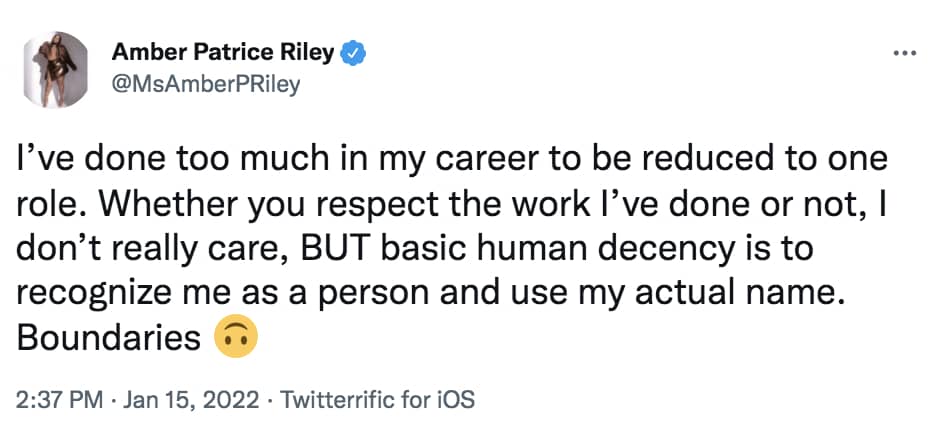
Amber Riley has never been the one to be played with, but it doesn’t mean that she hasn’t had to leave her throne to reprimand the jesters. In a searing tweet, Riley addressed the faux pas of so-called fans referring to her as “Mercedes,” a character she played in the popular TV musical Glee.
“I despise when ppl call me Mercedes,” said Riley. “Put some respect on my name. Call me AMBER or RILEY. It’s wild that I even have to say that. No shade to the show/character that gave me a career, but please stop this s—. I don’t answer to it, and if you do it facetiously I’ll block you.”

This would be a great time to revisit Riley’s acting credits outside of Glee. With her television career taking off in 2002, Riley first starred in the Gerry Cohen directed comedy St. Sass, written by Glee and American Horror Story creator Ryan Murphy. She went on to star in a host of TV movies, such as One Christmas Wish, The Wiz Live!, The Little Mermaid Live!, and the recent 2021 holiday pic Christmas Déjà Vu.
In addition, the American Idol alumna was in Todrick Hall’s 2016 musical Straight Outta Oz, the 2018 Tyler Perry film Nobody’s Fool, Joshua Caldwell’s 2020 crime drama Infamous, and a part of Robin Thede’s TV series A Black Lady Sketch Show. In 2017, she won the Laurence Olivier Award for “Best Actress in a Musical.”
Review: ‘Christmas Déjà Vu,’ Starring Amber Riley And Loretta Devine, Stands Out Among Holiday Films
Six years of Riley’s career, from 2009 through 2015, involved her playing Mercedes Jones on Glee. The character was her most prominent and memorable role.
Riley continued on Twitter, “I’ve done too much in my career to be reduced to one role. Whether you respect the work I’ve done or not, I don’t really care, BUT basic human decency is to recognize me as a person and use my actual name. Boundaries.”

It’s a reasonable request, although not a humble one. Imagine an excited, star-struck fan overwhelmed with emotions engaging with someone they’ve admired via their entertainment devices only to be shamed for calling the star by their character’s name. Not only does the fan have to deal with the public embarrassment of being called out, but the very sparkle of admiration is depleted and that celebrity could possibly lose a fan.
On the other hand, fans should take into consideration that celebrities, although famous, also are human and usually very sensitive. Now that fans know that calling actors by their characters’ name is annoying, practicing empathy will be the most efficient and respectable act in fan and celebrity interactions.



